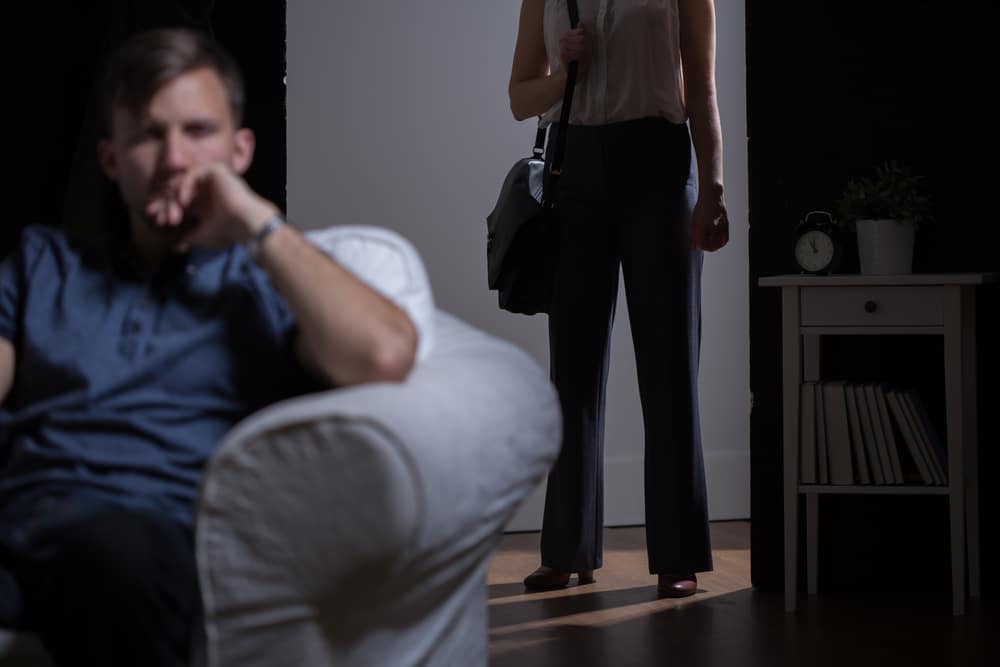 Living with a drug addict can be traumatic, damaging, and dangerous. If your loved one is facing a substance use disorder, it can be an unlivable situation for yourself and your family. This is especially true if you have children together. Making the decision to kick someone you care about out of their home is a big decision. If you’re at that point, there is something undeniably wrong with your current situation.
Living with a drug addict can be traumatic, damaging, and dangerous. If your loved one is facing a substance use disorder, it can be an unlivable situation for yourself and your family. This is especially true if you have children together. Making the decision to kick someone you care about out of their home is a big decision. If you’re at that point, there is something undeniably wrong with your current situation.
Unfortunately, kicking someone out can be morally and legally difficult. It’s crucial to take the right steps when learning How to Kick a Drug Addict Out of the House. Even if you have to for your own safety or that of your family, people have a right to their homes and living spaces. Kicking someone out will result in repercussions and will have legal ramifications. It’s crucial to take the right steps to protect yourself, your family, and your home. Hopefully, you also have the resources to take steps to protect your loved one and move them into a new situation as they leave yours.
Table of Contents
ToggleWhat Are Your Options?
It’s always a good idea to go through your options to choose the least harmful solution. You’re living with someone in a situation that is not livable.
Rehab and Therapy
Even if you don’t ever want to live with this person again, with or without treatment, it’s important to try to get them into treatment. Drug addiction treatment is covered by insurance and protected by law.
If your loved one is willing to go to treatment, they could stay there for 30-90 days and then move into a sober living home following treatment. This would give them the best possible opportunity to recover, to make a new life for themselves, and to retain as much of their life, career, and potential as possible.
Of course, many people are not ready to go to rehab. Even an intervention isn’t always successful. Chances are, you’ve also discussed and talked rehab and treatment over with them. If it doesn’t work, moving on and allowing them to come to treatment in their own time may be the best choice for your mental and physical health.
Ask
Your loved one is unlikely to be willing to simply get up and leave but they might be. Film the interaction and be civil. If you can simply explain that living with this person is not conductive to your mental or physical health and they agree, your problem is solved. They still have to move out, which might take longer, but you have a moral and legal grounds for them doing so.
Calling the Police
In most states, it’s illegal to directly kick someone out of their home. This is especially true if this is their primary place of residence, if they co-signed the lease or mortgage, or can otherwise prove they live there. Kicking a drug addict (even your child) out of your home can result in them suing you and you losing, even if you own the home.
That’s important because everyone has a right to have a roof over their head. Even if it’s unfair to you, they you granted them a right to live in your home and you can’t kick them out without short notice or at all if they don’t have the means to find a new place. Instead, your best option may be to call the police to document instances of emotional or physical violence. Doing so is the first step to taking this to court.
Be Brave. Get Help.
Taking Your Case to Court – How to Legally Remove an Alcoholic or a Drg Addict From Your Home
If you have evidence that your loved one is physically or emotionally abusive, dangerous to be around, or putting you or your family in danger, going to court may be the best option. Here, most judges will be unwilling to kick someone out on the basis of substance use alone. They have to be using substance in a way that poses harm to you or your family.
This is significantly easier if you have children who might be affected by drug use, if the individual is being abusive, or if they are engaging in criminal activity to fund substance abuse. In most cases, you’re asking for exclusive possession of the family home in this scenario. Having that granted means having significant evidence of wrongdoing on the part of the individual being asked to leave.
Taking this to court may mean:
- The judge rules that neither party has to leave
- The judge rules that one party (this may be you) has to leave but the other has to make payments to account for the value of the lost home
- The judge rules that one party has to leave but the remaining party is morally obligated to buy-out their portion of the home
- The judge rules that one party must leave temporarily
- The judge rules that one party must leave while placing restrictions on sale, rental, or changes to the home.
Here, your rights will heavily depend on the history of the home, what other opportunities for living are available, and the mortgage or rental contract. For example, if you’re living in a home that was their grandfather’s, it’s highly unlikely that you will be granted an order of sole occupancy without significant restrictions. Laws vary heavily by state, so you likely want to contact a lawyer to discuss your options and the likely outcomes.
How To Get A Drug Addict Out Of Your House
 If you’re facing a roommate or subletter who is using drugs, you may have a much easier time of kicking them out. For example, if you used a contract which explicitly states that the use of illegal drugs breaks the contract, you have a legal ground to kick them out. You might also be required to take this to court. If you live with the individual, your ability to have a roommate kicked out will be almost solely based on duration of tenancy (you’ve lived there longer) and the fact that they make it impossible or difficult to live there. This is almost impossible if they’ve lived there longer or the rental contract is in their name.
If you’re facing a roommate or subletter who is using drugs, you may have a much easier time of kicking them out. For example, if you used a contract which explicitly states that the use of illegal drugs breaks the contract, you have a legal ground to kick them out. You might also be required to take this to court. If you live with the individual, your ability to have a roommate kicked out will be almost solely based on duration of tenancy (you’ve lived there longer) and the fact that they make it impossible or difficult to live there. This is almost impossible if they’ve lived there longer or the rental contract is in their name.
Kicking someone out of their home is difficult, and for good reason. Rendering a person homeless, especially at a time of mental and physical disadvantage as is caused by substance abuse, leaves them vulnerable. Homelessness kills, causes worsening injuries, and dramatically increases risks of drug overdose, infection, and death. Working with authorities to move someone from your place of residence to state care or to medical care may be the best choice for them.
However, it’s understandable that a drug addict can be significantly damaging to your own physical, emotional, and mental health. That’s why there are resources to forcibly evict people who are causing a danger to you and to others.
If your friend, spouse, sibling, parent, or child is addicted to drugs, tough love and kicking them out may or may not be the best option. That heavily depends on your situation and theirs. Hopefully you have the resources and ability to attempt to move them into treatment and care while kicking them out. If not, make sure that you leave the door open to them asking you for help getting that treatment when they’re ready for it. Just because you cannot live with a person anymore doesn’t mean you don’t care about them and having time and space to recover will give you the mental resources to help them better when they’re ready.
If you or your loved one needs help in knowing how to deal with an addicted loved one, please contact Laguna Shores today, We are here to support you. Reaching out for help takes courage – but you can do it.


 Matthew Beck B.A, M.A, LMFT
Matthew Beck B.A, M.A, LMFT 


